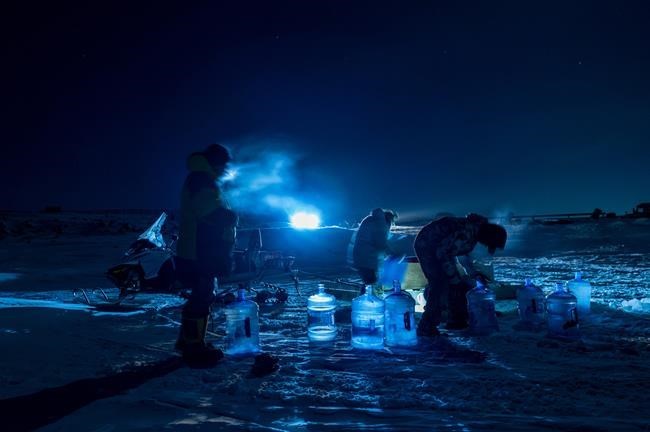IQALUIT, Nunavut ÔÇö Iqaluit is getting $214 million from the federal government to fix its water infrastructure after the Nunavut capitalÔÇÖs water was contaminated with fuel twice in the last six months.┬á
Prime Minister Justin Trudeau announced the funding at a virtual press conference on Friday. 
"This is a positive change for the people of Iqaluit and for the local economy," Trudeau said. 
A packed room of people watching the announcement at Iqaluit City Hall broke into applause after the announcement. The money will come from the federal Disaster Mitigation and Adaptation fund.
Trudeau said it will be used to create a new water reservoir and to improve the existing water distribution system.
The cityÔÇÖs some 8,000 residents couldnÔÇÖt drink their tap water for 60 days last fall after it was found to be contaminated with fuel.┬á
The treatment plant has been off-line since January when fuel was found in the water again.
The city had previously asked Ottawa for $180 million to fix its aging water infrastructure. 
Iqaluit Mayor Kenny Bell said the new infrastructure will be built in phases over four years.
ÔÇ£I am elated and beyond thankful to the Government of sa╣·╝╩┤½├¢, not only for listening to our request, but for truly hearing us and taking the critical action required to address the long-term water crisis that has been impacting Iqalummiut," Bell said.┬á
The project will see the excavation and creation of a new water reservoir next to the city's existing water source at Lake Geraldine. It will draw water from one of two alternative water sources that the city has not yet named.
Premier P.J. Akeeagok said the improvements are essential to addressing the city's housing gap.
"This upgraded infrastructure will not only be able to mitigate the impacts of climate change, but it will also meet the needs of our expanding population," Akeeagok said. 
"Access to clean, safe water is a right that should be available to any community. Nunavummiut have struggled to gain this basic right for far too long."
The announcement comes the day after Nunavut's Privacy Commissioner issued a report on the territorial government's decision to withhold about 86 pages of water testing data sought by The Canadian Press through an Access to Information request. 
In a report Thursday, Graham Steele said the Nunavut government erred when it accepted a request from the City of Iqaluit to redact raw quality testing data from the request.
"It appears that Health adopted the City of IqaluitÔÇÖs objections without any independent analysis of whether those objections had merit. Health redacted everything to which the City of Iqaluit objected. That was an error," Steele wrote.
The Department of Health argued that releasing the water data could impair its relationship with the City of Iqaluit.
"It is practically inconceivable that this broad, multi-point, ongoing relationship could be impaired by the one-time release of water-quality data. One would hope that the leaders of the GN and the City of Iqaluit are made of sterner stuff," Steele wrote.
"If ever there was a case in which a public body should exercise its discretion in favour of disclosure, this is it  Can the operator and regulator of a public water supply really keep water-quality data to themselves? I expect Nunavummiut would be shocked if they can."
Steele recommended the Nunavut government release the data without redaction. Nunavut's health minister now has 30 days to respond.
This report by The Canadian Press was first published April 1, 2022.
Emma Tranter, The Canadian Press



